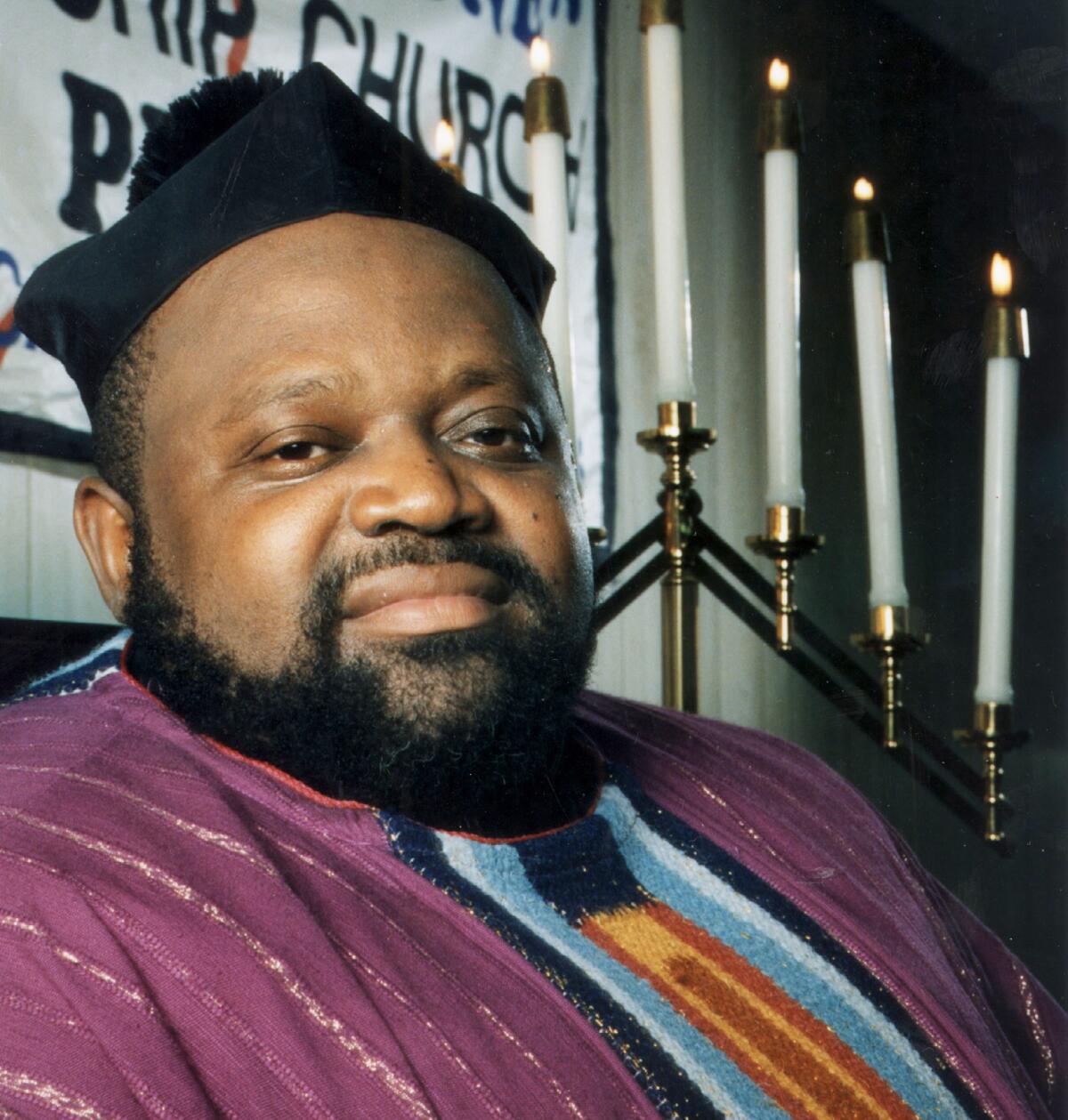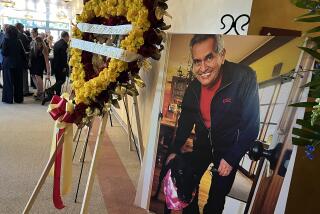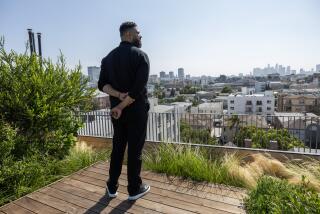Archbishop Carl Bean, ‘beacon of light’ in LGBTQ church movement and AIDS activism, dies

The neatly folded suicide note was written in pencil in the uncertain hand of a 12-year-old.
“Dear Mother and Dad, I know you don’t love me,“ it began.
Carl Bean had just confided to his foster parents that he had known he was gay since childhood when he had a crush on a boy “with soft waves in his hair, eyes like brown embers, coal black skin and a smile that warmed my heart.” His foster mother responded by taking him to her minister, who seemed puzzled by the disclosure. Back home, he took everything he could find in the medicine cabinet and waited for his isolation and lack of self-worth to fade out.
Yet he lived, and at 16 he hopped a Greyhound bus to Harlem and then to Detroit where he rode the crest of the disco era with the Motown hit “Born This Way,” an eventual LGBTQ anthem that later inspired Lady Gaga to write her own version of the song.
More than a gospel and disco star, Bean soon established himself as a towering and compassionate figure in South Los Angeles where he led a church that was a haven for the Black LGBTQ community and founded an organization that brought care and attention to people of color living with HIV and AIDS at a time when most of the nation’s resources were being directed to white neighborhoods.
A jovial and charismatic man who was known as “pops” to many, Bean died Tuesday in Los Angeles after a lengthy illness, according to an announcement from the Unity Fellowship Church Movement. He was 77.
“He became a beacon of light to those who needed support and attention at a time when people looked down upon those who had HIV or AIDS and were members of the LGBTQ community,” said Najee Ali, a Los Angeles community activist and former employee with the Minority AIDS Project.
He called Bean “an icon and game changer” in South L.A.
Lady Gaga tweeted her respect and admiration for Bean in May on the 10th anniversary of her Grammy-nominated album “Born This Way.”
“Thank you for decades of relentless love, bravery, and a reason to sing,” she tweeted. “So we can all feel joy, because we deserve joy. Because we deserve the right to inspire tolerance, acceptance, and freedom for all.”
Bean’s spiritual journey was complex but by the time he came to L.A. he was at peace as a gay man and determined to focus attention on the rising specter of the AIDS crisis. In 1982, he began serving as an ordained minister who was gay and went on to become founder and pastor of Unity Fellowship of Christ Church, considered the mother church of the Unity Fellowship Church Movement. His work spurred the creation of new churches across the U.S.
In 1992, Bean told the Los Angeles Times that Unity Fellowship Church began small — just a few people gathered in a home for Bible study. From the start, Bean intended the church to be a haven for LGBTQ people, people dealing with addiction, incest survivors and others.
“My ministry will always be a continuum of dealing with the disenfranchised, providing for the poorest of the poor, the undocumented person, persons who can’t speak the language, persons in and out of the prison system, kids out of the gangs ... to touch those who are considered the untouchables,” Bean said.
Beatitude Bishop Zachary G. Jones, the presiding prelate of the Unity Fellowship Church Movement, said it’s vital that the church continue its work and expand its efforts to help older adults living with HIV and AIDS, advocate for improved medications and help people deal with poverty.
Jones, who had worked with Bean since 1982, said he remembers his friend’s “powerful moments of advocacy.” He pointed to a hunger strike where he sought to bring attention to how “very broken and very traumatized” the Black LGBTQ communities were by HIV in the years before medications, support groups and other services arrived.
“He wanted to destigmatize that oppression that we were experiencing as people in hiding, people without a voice, as people at that particular time that were dying,” Jones said. “He used his connections and his affluence through Motown and the entertainment world to lift our community ... they found their faith and they found their self-identify through his work.”
Bean’s legacy also includes founding the Minority AIDS Project as part of the church’s outreach ministry. The nonprofit was established in 1985 and was the first community HIV/AIDS organization managed by people of color in the U.S.
Born May 26, 1944, in Baltimore, Bean was involved in church life from an early age, according to his memoir, “I Was Born This Way: A Gay Preacher’s Journey Through Gospel Music, Disco Stardom and a Ministry in Christ. But when he realized he was gay, there was no one to turn to, not even the church.
When he tried to kill himself, Bean figured death would take care of the loneliness he felt when everything he loved — his foster parents, his schoolmates and his church — shunned him, he said in an interview with The Times in 1992. He later reunited with his birth mother, who accepted his sexuality.
In 1992, Bean was consecrated as the first presiding bishop of the Unity Fellowship Church Movement and in 1999, was made its first archbishop.
The United Fellowship Church Movement is a denomination of Progressive Christian Churches and is based on liberation theology — a Christian approach to theology that doesn’t oppress women, isn’t based on male hierarchy, lifts up LGBTQ people, fights for social justice, and “teaches that all people have the right to question, to study, and interpret the Bible in a manner that frees from oppression,” according to the church’s website.
More than 30 years on, the Minority AIDS Project continues it work to provide free HIV and AIDS resources and services, particularly to Black and Latino communities in central and south Los Angeles.
Services include outreach to men who have sex with men, free HIV counseling and testing, staff training in HIV/AIDS issues for social services agencies and in-home medical case management for people living with HIV and AIDS.
Ali said that Bean’s work with the Minority AIDS Project came at a time when Black people and other people of color were “completely shut out” from HIV and AIDS funding, even as cases were exploding.
While Ali was one of the few heterosexual people working with the Minority AIDS Project at the time, he said Bean told him: “We love you just as you are so we hope you’ll love us and accept us just as we are.”
More to Read
Sign up for Essential California
The most important California stories and recommendations in your inbox every morning.
You may occasionally receive promotional content from the Los Angeles Times.












